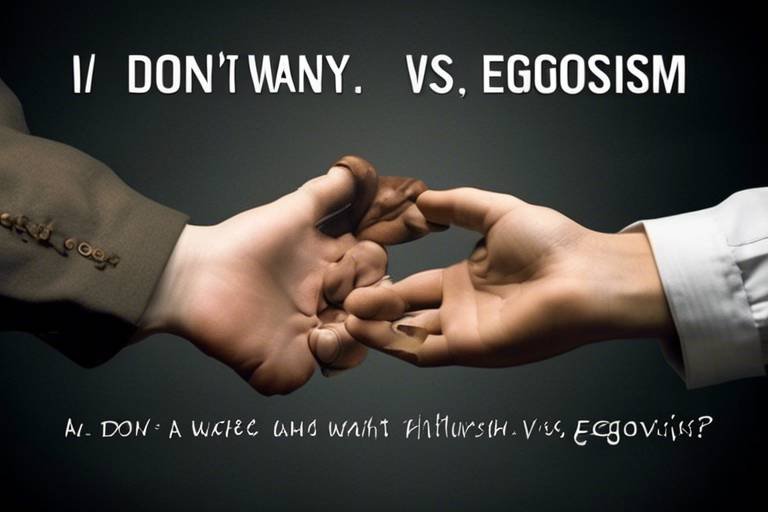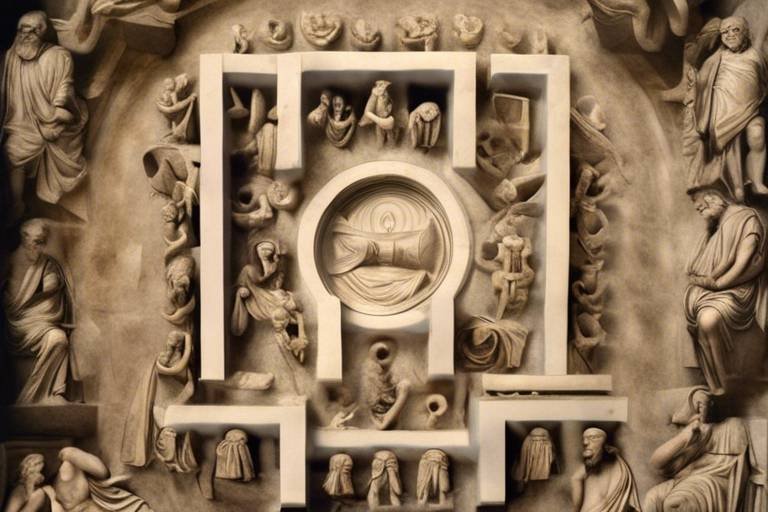The Influence of Socratic Thought on Western Philosophy
The journey through Western philosophy is akin to navigating a vast ocean, with waves of thought crashing against the shores of time. At the heart of this philosophical sea lies the profound influence of Socratic thought, a beacon that has guided countless thinkers and scholars. Socrates, often hailed as the father of Western philosophy, introduced methods and ideas that have shaped our understanding of ethics, knowledge, and the very essence of humanity. His legacy is not merely a relic of the past; it continues to resonate in contemporary philosophical discourse and educational practices.
Socratic philosophy encourages us to question everything, challenging the status quo and pushing the boundaries of our understanding. This approach is not just about seeking answers, but about the process of inquiry itself. Imagine standing at the foot of a towering mountain, where each question you ask is a step towards the summit of knowledge. Socrates believed that through dialogue and rigorous questioning, individuals could achieve a deeper understanding of themselves and the world around them. This method, known as the Socratic Method, has become a cornerstone of modern education and critical thinking.
The impact of Socratic thought extends beyond the classroom; it has permeated various philosophical disciplines, influencing ethical frameworks, epistemology, and even political thought. His emphasis on ethics and virtue laid the groundwork for subsequent philosophers, including his most famous student, Plato. Socrates' insistence that "the unexamined life is not worth living" serves as a powerful reminder of the importance of self-reflection and the pursuit of truth. In this article, we will explore the various facets of Socratic philosophy, examining its methods, key ideas, and the lasting legacy it has left on Western thought.
As we delve deeper into the Socratic influence, we will uncover how his ideas have shaped not only the philosophical landscape but also the way we approach moral dilemmas and knowledge acquisition today. The essence of Socratic thought is not confined to ancient texts; it is alive and thriving in modern discussions, where the quest for understanding and ethical living continues to challenge and inspire us. So, let’s embark on this intellectual journey, exploring the profound impact of Socratic philosophy on Western thought.
- What is the Socratic Method?
The Socratic Method is a form of cooperative argumentative dialogue that stimulates critical thinking and illuminates ideas through questioning.
- How did Socrates influence Plato?
Socrates profoundly influenced Plato's works, particularly in the development of his theories on forms and the nature of reality.
- What are the key ideas of Socratic philosophy?
Key ideas include ethics, virtue, and the relentless pursuit of knowledge, which have shaped various philosophical discussions throughout history.
- Why is Socratic thought relevant today?
Socratic thought remains relevant as it encourages critical thinking, self-examination, and ethical decision-making in contemporary society.

The Socratic Method
The Socratic Method is not just a teaching technique; it’s a profound way of engaging with the world around us. Imagine sitting down for a coffee with a friend and instead of discussing the latest Netflix series, you dive deep into questions like, “What is justice?” or “What does it mean to live a good life?” This is the essence of the Socratic Method—a form of cooperative argumentative dialogue that encourages critical thinking and self-discovery through a series of probing questions.
At its core, the Socratic Method is about asking questions rather than providing answers. Socrates believed that through questioning, individuals could uncover their own beliefs and assumptions, leading to greater clarity and understanding. This approach not only stimulates intellectual curiosity but also fosters a deeper connection to the subject matter. It’s like peeling an onion—each layer reveals more about the core of your understanding, and sometimes, it even brings tears of realization!
Historically, this method has shaped educational practices and philosophical inquiry. In ancient Greece, Socrates would engage his fellow citizens in discussions in the marketplace, challenging them to think critically about their own views. This method has evolved and is still widely used in modern education, particularly in law schools and critical thinking courses, where students are encouraged to debate and analyze rather than memorize facts.
To illustrate the effectiveness of the Socratic Method, let’s consider a simple interaction:
| Question | Response | Follow-Up Question |
|---|---|---|
| What is virtue? | Virtue is doing good things. | What do you mean by "doing good things"? |
| What is justice? | Justice is fairness. | How do you define fairness? |
This table demonstrates how a simple question can lead to deeper inquiry and reflection. The Socratic Method is not about reaching a definitive answer but rather about the journey of exploration and understanding. It invites participants to engage actively with their thoughts and beliefs, making it a powerful tool for personal and intellectual growth.
Moreover, the Socratic Method has significant implications for various fields beyond philosophy. In psychology, for instance, it encourages self-reflection and personal insight, helping individuals understand their motivations and behaviors. In business, it can foster innovation by promoting a culture of questioning and critical analysis, leading to better decision-making processes. The ripple effects of this method are vast, highlighting its importance in fostering a well-rounded, thoughtful society.
In summary, the Socratic Method is a transformative approach to dialogue and learning. It not only enhances critical thinking skills but also cultivates a deeper understanding of oneself and the world. By embracing this method, we can all become better thinkers, better communicators, and ultimately, better citizens. So, the next time you find yourself in a conversation, consider channeling your inner Socrates—ask questions, challenge assumptions, and see where the dialogue takes you!

Key Socratic Ideas
When we dive into the realm of Socratic thought, we encounter a treasure trove of ideas that have shaped not just philosophy, but the very fabric of Western civilization. Socrates, often referred to as the father of Western philosophy, introduced concepts that challenge us to rethink our understanding of ethics, virtue, and the quest for knowledge. His approach was not just about answering questions but about igniting a flame of inquiry that encourages individuals to explore the depths of their own beliefs. One of the most significant aspects of Socratic philosophy is the idea that knowledge is intertwined with virtue, a notion that has resonated through the ages.
At the heart of Socratic thought lies the belief that virtue is knowledge. This means that if we truly know what is right, we will naturally act in accordance with that knowledge. Socrates famously stated, “No one does wrong willingly,” suggesting that wrongdoing stems from ignorance rather than malice. This perspective not only reshapes our understanding of morality but also places a heavy emphasis on the importance of education and self-awareness. In contemporary discussions, this idea prompts us to consider how our own knowledge—or lack thereof—shapes our actions and decisions in everyday life.
Furthermore, Socrates championed the pursuit of knowledge as a lifelong endeavor. He believed that questioning and critical thinking are essential to personal growth and understanding. This relentless pursuit is what distinguishes humans from other beings. In this light, the Socratic Method becomes a powerful tool, as it encourages individuals to engage in dialogue, ask probing questions, and challenge assumptions. Such practices are not only applicable in philosophical discourse but also in various fields, including education, law, and even personal relationships.
Another key idea introduced by Socrates is the concept of ethical relativism. He argued that moral truths are not absolute but rather depend on the context and the individuals involved. This notion has sparked extensive debate among philosophers and ethicists alike, leading to the development of various moral theories. The implications of Socratic ethics are profound, as they compel us to reflect on our own values and the societal norms that shape them. In a world where ethical dilemmas abound, Socratic thought encourages us to navigate these complexities with a critical eye.
In summary, the key ideas of Socratic philosophy revolve around the intricate relationship between knowledge, virtue, and ethical behavior. By promoting a culture of questioning and self-discovery, Socrates has left an indelible mark on Western thought. His influence can be seen not only in the works of his student Plato but also in the broader landscape of philosophical inquiry that continues to evolve today. As we engage with these ideas, we are reminded of the importance of striving for knowledge and understanding in our own lives.
- What is the Socratic Method?
The Socratic Method is a form of cooperative argumentative dialogue that stimulates critical thinking and illuminates ideas through asking and answering questions.
- How did Socrates influence modern philosophy?
Socrates laid the groundwork for Western philosophy by introducing ideas about ethics, virtue, and the importance of knowledge, which continue to influence contemporary philosophical discussions.
- What does Socratic ethics teach us?
Socratic ethics teaches that knowledge is essential for virtuous action, emphasizing the importance of education and self-awareness in moral decision-making.

Ethics and Virtue
When we dive into the depths of Socratic thought, one of the most compelling aspects is his understanding of ethics and virtue. Socrates believed that at the heart of a good life lies the pursuit of knowledge, which he argued was intrinsically linked to being virtuous. Imagine a compass that not only points north but also guides you toward moral excellence; this is how Socrates viewed knowledge. He posited that knowing what is right naturally leads one to do what is right. This profound connection between knowledge and virtuous action has sparked endless discussions in the realm of moral philosophy.
To Socrates, virtue was not just a set of rules to follow but a way of being that stemmed from understanding. He famously stated, "Knowledge is virtue," suggesting that ignorance is the root of all wrongdoing. This idea is revolutionary because it shifts the focus from merely following laws or societal norms to cultivating a deep understanding of oneself and the world. In essence, if we truly grasp what is good, we cannot help but act accordingly. This perspective invites us to consider several key implications:
- Self-Reflection: Socratic ethics encourages individuals to engage in self-examination, questioning their beliefs and actions.
- Continuous Learning: The pursuit of knowledge is a lifelong journey that fosters personal growth and ethical development.
- Community Engagement: By discussing and debating moral issues, individuals learn from one another, enriching their understanding of virtue.
This belief in the transformative power of knowledge has not only shaped ancient philosophical thought but continues to resonate in modern discussions about ethics. For instance, contemporary ethical frameworks often emphasize the importance of informed decision-making and the role of education in fostering moral behavior. Think about how we approach ethical dilemmas today—many of us seek out information, engage in discussions, and reflect on our values before making decisions. This is a direct reflection of Socratic influence, highlighting the relevance of his ideas even in our fast-paced, information-driven world.
Moreover, Socratic ethics has provided a foundation upon which later philosophers built their theories. The likes of Aristotle, Kant, and even modern existentialists have grappled with the implications of Socratic thought. They have expanded on the idea that knowledge leads to virtue, exploring how our understanding of the world shapes our moral choices. This ongoing dialogue ensures that Socratic ethics remains a vital part of philosophical inquiry.
In conclusion, the intertwining of ethics and virtue in Socratic philosophy serves as a powerful reminder of the importance of knowledge in our moral lives. By understanding the essence of what it means to be virtuous, we can strive to live more meaningful and ethical lives. Socrates invites us to become lifelong learners, constantly questioning and refining our understanding of right and wrong. As we navigate the complexities of modern life, let us carry forward his legacy, continuously seeking knowledge to illuminate our paths toward virtue.
1. What is the Socratic Method?
The Socratic Method is a form of cooperative argumentative dialogue that stimulates critical thinking and draws out ideas and underlying presumptions.
2. How does Socratic thought influence modern ethics?
Socratic thought influences modern ethics by emphasizing the importance of knowledge in moral decision-making, encouraging individuals to reflect on their values and the implications of their actions.
3. Why is self-reflection important in Socratic ethics?
Self-reflection is crucial in Socratic ethics because it allows individuals to examine their beliefs, understand their motivations, and align their actions with their moral values.
4. Can Socratic principles be applied in everyday life?
Absolutely! Socratic principles can be applied in everyday life by encouraging open dialogue, questioning assumptions, and seeking deeper understanding in our interactions and decisions.

Knowledge as Virtue
When we dive into the depths of Socratic thought, one of the most striking concepts that emerges is the idea that knowledge is not just power; it is, in fact, a form of virtue. Socrates believed that possessing knowledge inherently leads to virtuous actions. This idea is profound because it suggests that ignorance is the root of all wrongdoing. Imagine someone who genuinely understands the consequences of their actions—would they still choose to act immorally? Socratic philosophy posits that the answer is a resounding no. This perspective not only challenges us to reflect on our own understanding but also encourages a deeper pursuit of knowledge as a pathway to ethical living.
To illustrate this concept further, let's consider the implications of knowledge as virtue in everyday life. When we equip ourselves with knowledge, we become more aware of our responsibilities and the impact of our choices on others. For instance, think about a situation where someone is faced with a moral dilemma. If that person has a solid understanding of ethical principles, they are more likely to make a decision that aligns with virtuous behavior. This connection between knowledge and virtue creates a ripple effect, influencing not only the individual but also those around them.
Moreover, the Socratic emphasis on knowledge as virtue has had a lasting influence on various philosophical frameworks. In modern ethics, many thinkers argue that the cultivation of knowledge should be prioritized in moral education. By fostering critical thinking and self-awareness, we empower individuals to make informed choices that contribute positively to society. This approach is evident in educational systems that emphasize the importance of ethics and moral reasoning, encouraging students to engage with complex issues rather than simply accepting information at face value.
In summary, the Socratic belief that true knowledge equates to virtue is a powerful idea that resonates through the ages. It invites us to continuously seek understanding, not just for the sake of knowledge itself, but as a means to enhance our moral compass. As we embrace this philosophy, we not only enrich our own lives but also contribute to the betterment of our communities. The journey toward knowledge is, therefore, not just an intellectual pursuit; it is a noble quest toward becoming better individuals.
- What is the Socratic Method? The Socratic Method is a form of cooperative argumentative dialogue that encourages critical thinking through questioning.
- How did Socrates influence Western philosophy? Socrates laid the groundwork for many philosophical discussions, particularly in ethics, epistemology, and the importance of dialogue.
- What are the key ideas of Socratic thought? Central concepts include the pursuit of knowledge, the relationship between knowledge and virtue, and the importance of questioning assumptions.
- How does Socratic thought relate to modern ethics? Socratic principles continue to inform contemporary ethical frameworks, emphasizing knowledge as a foundation for moral decision-making.

Impact on Modern Ethics
The impact of Socratic thought on modern ethics cannot be overstated. Socrates’ insistence that knowledge is fundamental to virtue has reverberated through the ages, influencing how we approach moral dilemmas today. In a world that often feels chaotic, where ethical boundaries can seem blurred, Socratic principles provide a guiding light. The idea that understanding is the precursor to ethical behavior encourages individuals to seek knowledge before making decisions that affect themselves and others.
One of the key ways Socratic thought influences modern ethics is through its emphasis on critical thinking. In contemporary discussions about morality, the ability to question assumptions and engage in dialogue is paramount. This Socratic method of inquiry fosters an environment where ethical discussions are not just about finding the right answer, but about exploring the complexities of human experience. For example, when faced with ethical questions in business practices, leaders can benefit from applying Socratic questioning to examine their values and the potential impact of their decisions on stakeholders.
Moreover, the Socratic belief that “an unexamined life is not worth living” resonates deeply in today’s ethical landscape. It challenges individuals to reflect on their actions and the motivations behind them. This introspection is crucial in a society that often prioritizes speed over thoughtfulness. By encouraging individuals to pause and reflect, Socratic thought promotes a more conscientious approach to ethics. In this way, ethics becomes not just a set of rules to follow, but a dynamic process of growth and understanding.
Another significant impact of Socratic philosophy on modern ethics is its influence on various ethical theories. For instance, utilitarianism and deontology both incorporate elements of Socratic thought in their frameworks. Utilitarianism, which advocates for actions that maximize overall happiness, aligns with Socratic ethics in emphasizing the importance of knowledge in determining the best outcomes. Similarly, deontological ethics, which focuses on the morality of actions themselves rather than their consequences, echoes Socratic principles by stressing the significance of moral duties informed by knowledge.
In addition, many modern ethical frameworks prioritize the pursuit of knowledge as a means of achieving moral clarity. This can be seen in the rise of virtue ethics, which directly draws from Socratic ideas. Virtue ethics emphasizes the character of the moral agent and the importance of developing virtues through knowledge and practice. As individuals strive to cultivate virtues such as honesty, courage, and compassion, they reflect the Socratic ideal that knowledge and virtue are intertwined.
To encapsulate the profound influence of Socratic thought on modern ethics, consider the following table that outlines key Socratic concepts and their relevance today:
| Socratic Concept | Modern Ethical Relevance |
|---|---|
| Knowledge as Virtue | Encourages informed decision-making and personal responsibility. |
| Critical Thinking | Promotes dialogue and reflection in ethical discussions. |
| Examination of Life | Fosters personal growth and ethical awareness. |
| Virtue Ethics | Focuses on character development and moral integrity. |
In conclusion, the legacy of Socratic thought endures in modern ethical discussions, encouraging individuals to seek knowledge, engage in critical dialogue, and reflect on their moral choices. As we navigate the complexities of contemporary life, the teachings of Socrates remind us that the quest for understanding is not just a philosophical exercise, but a vital part of living a meaningful and ethical life.
- What is the Socratic Method? The Socratic Method is a form of cooperative argumentative dialogue that stimulates critical thinking and illuminates ideas through questioning.
- How does Socratic thought influence modern ethics? Socratic thought emphasizes the importance of knowledge and critical thinking in ethical decision-making, promoting a reflective and informed approach to morality.
- What are some examples of ethical theories influenced by Socratic thought? Utilitarianism and virtue ethics are examples of ethical frameworks that incorporate Socratic principles, focusing on knowledge, character, and moral integrity.
- Why is the examination of life important in ethics? Examining one’s life encourages introspection and growth, leading to more ethical choices and a deeper understanding of personal values.

The Pursuit of Knowledge
The pursuit of knowledge is not just an academic endeavor; it's a fundamental aspect of what it means to be human. Socrates, the father of Western philosophy, understood this deeply. He believed that the quest for knowledge was essential to living a good life. For him, knowledge wasn't merely about accumulating facts; it was about understanding ourselves and the world around us. This quest is like navigating a vast ocean—sometimes turbulent, sometimes calm, but always leading us to new shores of understanding.
Socrates famously said, "The unexamined life is not worth living." This statement encapsulates his belief that self-reflection and critical questioning are vital for personal growth. Imagine embarking on a journey without a map; you'd likely wander aimlessly. Similarly, without questioning our beliefs and assumptions, we risk drifting through life without direction. Socrates encouraged people to engage in dialogue, to ask questions, and to challenge their own perspectives. This method, known as the Socratic Method, is a powerful tool for fostering deep understanding and insight.
In today's world, the relevance of Socratic thought is more pronounced than ever. With the explosion of information available at our fingertips, distinguishing between what is valuable knowledge and what is mere noise can be overwhelming. Socratic questioning encourages us to sift through this information critically. By asking ourselves questions such as "What do I really know about this topic?" or "Why do I believe this?", we can cut through the clutter and arrive at a clearer understanding.
Furthermore, the pursuit of knowledge isn't just an individual endeavor; it's a communal one. Socrates believed that engaging in dialogue with others enhances our understanding. When we share ideas, challenge one another, and explore different viewpoints, we create a richer tapestry of knowledge. This collaborative approach is essential in today's interconnected world, where diverse perspectives can lead to innovative solutions to complex problems.
In essence, the pursuit of knowledge is a lifelong journey. It's about being curious, asking questions, and never settling for superficial answers. Socratic thought teaches us that true wisdom comes from recognizing our own ignorance and striving to overcome it. This journey can be messy, filled with contradictions and uncertainties, but it's precisely this complexity that makes the pursuit of knowledge so rewarding.
As we navigate our own paths in life, let us remember the Socratic ideal: that knowledge is not a destination but a continuous journey. By embracing this mindset, we can cultivate a deeper understanding of ourselves and the world, ultimately leading us to a more meaningful existence.
- What is the Socratic Method?
The Socratic Method is a form of cooperative argumentative dialogue that stimulates critical thinking and illuminates ideas. It involves asking and answering questions to encourage deeper understanding. - Why is the pursuit of knowledge important?
The pursuit of knowledge helps individuals grow, make informed decisions, and understand the world around them. It fosters critical thinking and self-awareness. - How can I apply Socratic questioning in my life?
You can apply Socratic questioning by consistently challenging your beliefs, asking open-ended questions, and engaging in discussions with others to explore different perspectives.

Socratic Influence on Plato
The relationship between Socratic thought and Plato's philosophy is nothing short of fascinating. Socrates, often regarded as the father of Western philosophy, laid the groundwork for many of the ideas that Plato would later expand upon in his own works. The influence of Socratic thought can be seen in various aspects of Plato's writings, particularly in his use of dialogue and his exploration of complex philosophical concepts. Plato, who was a student of Socrates, absorbed the teachings and methods of his mentor, and in doing so, he created a rich tapestry of philosophical inquiry that would shape the course of Western thought for centuries.
One of the most significant ways that Socratic thought influenced Plato was through the Socratic Method. This method, characterized by cooperative argumentative dialogue, encourages participants to engage in critical thinking and self-discovery. Plato adopted this style, using dialogue as a vehicle for exploring philosophical ideas in his works. For instance, in dialogues like the Apology and the Republic, Plato presents conversations that not only reflect Socratic questioning but also challenge readers to consider their own beliefs and assumptions. The dialogues serve as a platform for philosophical exploration, where ideas are dissected and examined through rigorous debate.
Moreover, Socrates' emphasis on ethics and virtue profoundly shaped Plato's philosophical outlook. Socratic teachings posited that knowledge is intrinsically linked to virtuous action, a concept that Plato would carry forward in his exploration of moral philosophy. In his works, Plato often grapples with the implications of this idea, suggesting that a true understanding of the good life is rooted in knowledge and wisdom. This relationship between knowledge and virtue becomes a central theme in many of Plato's dialogues, illustrating how Socratic thought provided a foundation for his ethical theories.
In addition to ethics, the Theory of Forms is another area where Socratic influence is evident. Socrates' quest for understanding the essence of concepts laid the groundwork for Plato's more abstract explorations. Plato proposed that non-material abstract forms, or ideas, are the most accurate representation of reality. This theory suggests that what we perceive in the physical world is merely a shadow of these higher truths. The Socratic practice of questioning and seeking deeper truths can be seen as a precursor to Plato's development of this complex philosophical framework.
In summary, the influence of Socratic thought on Plato is profound and multifaceted. Through the use of dialogue, the exploration of ethics, and the development of the Theory of Forms, Plato not only honored his mentor's legacy but also expanded upon it, creating a philosophical system that would resonate through the ages. The interplay between Socratic questioning and Platonic theory invites readers to engage in their own philosophical journeys, reminding us of the enduring power of inquiry and the pursuit of knowledge.
- What is the Socratic Method?
The Socratic Method is a form of cooperative argumentative dialogue that stimulates critical thinking and helps individuals discover their beliefs through questioning.
- How did Socrates influence Plato's philosophy?
Socrates influenced Plato through his methods of dialogue and inquiry, as well as through his teachings on ethics and virtue, which Plato expanded upon in his own works.
- What is Plato's Theory of Forms?
Plato's Theory of Forms posits that non-material abstract forms represent the most accurate reality, and that the physical world is merely a shadow of these higher truths.
- Why is Socratic thought important in modern philosophy?
Socratic thought is crucial in modern philosophy because it emphasizes the importance of questioning, critical thinking, and the pursuit of knowledge, which are foundational principles in philosophical inquiry today.

Dialogue and Dialectic
The art of dialogue is one of the most significant legacies that Socrates has bequeathed to Western philosophy. Through his method of questioning, he engaged in a form of conversation that was not just about exchanging ideas but was a profound exploration of truth and understanding. This method, known as the Socratic Method, emphasizes the importance of dialogue as a means of discovering knowledge and fostering critical thinking. It’s like peeling an onion; each layer you remove brings you closer to the core of understanding, but it also might make you cry a little as you confront challenging ideas.
In Socratic dialogues, the aim is not to win an argument but to seek clarity and insight. This cooperative argumentative dialogue involves asking and answering questions to stimulate deeper thought and illuminate ideas. Imagine a game of chess, where each move is a question that leads to a new possibility; the objective is not just to checkmate your opponent but to explore the vast landscape of ideas together. This approach has profoundly influenced educational practices, encouraging students to engage actively with material rather than passively receiving information.
Plato, Socrates’ most famous student, adopted this method and expanded upon it in his own works. In dialogues like The Republic and Phaedrus, Plato showcases the dialectic process as a way to uncover philosophical truths. The dialectic is more than just a back-and-forth exchange; it’s a dynamic process where ideas are tested, refined, and sometimes discarded in the pursuit of greater understanding. It’s akin to a dance, where each partner must be in tune with the other to create a harmonious flow of ideas.
Moreover, the Socratic method encourages participants to confront their assumptions and beliefs. It’s a bit like holding a mirror up to one’s thoughts; what you see may not always be flattering, but it’s essential for growth. This practice has laid the groundwork for various modern educational techniques, including the use of case studies and group discussions, which are prevalent in today’s classrooms. By fostering an environment where questioning is encouraged, educators can cultivate critical thinkers who are not afraid to challenge the status quo.
In summary, the influence of Socratic dialogue and dialectic extends far beyond the ancient Greek context. It has shaped the way we approach learning, discussion, and even conflict resolution in contemporary society. By engaging in meaningful dialogues, we not only enrich our own understanding but also contribute to the collective wisdom of our communities. Just as Socrates believed that an unexamined life is not worth living, we can assert that an unexamined dialogue is not worth having.
- What is the Socratic Method? - It is a form of cooperative argumentative dialogue that encourages critical thinking through questioning.
- How did Socratic dialogue influence modern education? - It has inspired techniques like group discussions and case studies, promoting active learning.
- Why is dialogue important in philosophy? - Dialogue allows for the exploration of ideas, leading to deeper understanding and insight.

Plato's Theory of Forms
Plato's Theory of Forms is one of the most significant contributions to Western philosophy stemming from Socratic thought. This theory posits that the material world we perceive through our senses is just a shadow of a higher, unchanging reality composed of abstract forms or ideas. Imagine walking into a room filled with different chairs. Each chair has its unique characteristics—color, shape, size—but they all share the essence of 'chairness.' This essence, according to Plato, is the Form of the Chair, an ideal that exists beyond our physical world.
To delve deeper, Plato believed that these Forms are perfect and immutable, unlike the imperfect objects we encounter daily. For instance, when we see a beautiful painting, we recognize beauty itself, which is a Form. However, that beauty is only a reflection of the ideal Form of Beauty. This notion leads us to question how we can know these Forms if they are not tangible. Plato argued that through philosophical reasoning and dialectical methods—echoing Socratic principles—we can grasp these eternal truths.
Furthermore, Plato categorized Forms into different types, with the Form of the Good being the highest. He suggested that all other Forms derive their essence from this ultimate Form. In this hierarchy, knowledge and understanding become paramount, as they guide us toward the Good. The implications of this theory extend beyond metaphysics; they touch ethics, aesthetics, and even politics, shaping how we perceive reality and our place within it.
Here’s a brief overview of key aspects of Plato's Theory of Forms:
| Aspect | Description |
|---|---|
| Immateriality | Forms exist beyond the physical realm, representing pure ideas. |
| Universality | Forms are the essence shared by all particular instances. |
| Hierarchy | Forms are organized with the Form of the Good at the top. |
| Knowledge | True knowledge is the understanding of these Forms. |
In essence, Plato's Theory of Forms challenges us to look beyond the surface of the world around us. It invites us to engage in a deeper inquiry about the nature of existence and the ideals that govern our understanding of reality. By embracing the Socratic method of questioning, we can embark on a journey toward discovering these eternal truths, enriching our philosophical discourse and personal understanding.
- What is the main idea behind Plato's Theory of Forms?
The main idea is that the physical world is a reflection of a higher, unchanging reality made up of abstract Forms or ideas. - How does the Theory of Forms relate to Socratic thought?
Plato's theory builds on Socratic principles of questioning and dialogue, encouraging the pursuit of knowledge and understanding of eternal truths. - Why is the Form of the Good considered the highest Form?
The Form of the Good is seen as the source of all other Forms, representing the ultimate truth and guiding moral understanding. - Can we access these Forms?
According to Plato, we can access Forms through philosophical reasoning and dialectical methods, much like Socrates did in his dialogues.

The Legacy of Socratic Thought
The legacy of Socratic thought is nothing short of monumental. It has paved the way for countless philosophical discussions and has become a cornerstone of Western intellectual tradition. Socrates, through his unique method of questioning and dialogue, has instilled a sense of critical inquiry that remains relevant even today. His influence can be seen in various philosophical movements, including existentialism, pragmatism, and even in modern ethical debates.
One of the most profound aspects of Socratic legacy is its emphasis on the importance of self-examination and the unexamined life. Socrates famously stated, "The unexamined life is not worth living." This idea resonates across centuries, prompting individuals to reflect on their values, beliefs, and the very nature of existence. In a world cluttered with information and distractions, this call to introspection is more crucial than ever.
Moreover, Socratic thought has influenced various fields beyond philosophy. For instance, in education, the Socratic Method continues to be a powerful tool for promoting critical thinking and encouraging students to engage deeply with material. This method not only fosters a spirit of inquiry but also cultivates essential skills such as reasoning and articulation of ideas. Many educators today utilize this approach to create dynamic classroom environments where students feel empowered to explore and question.
In the realm of ethics, Socratic principles have shaped contemporary moral frameworks. The belief that knowledge is inherently tied to virtue has inspired modern thinkers to prioritize informed decision-making. For example, in discussions surrounding social justice and ethical leadership, the Socratic emphasis on knowledge as a guiding principle encourages leaders to act with integrity and moral clarity.
Furthermore, Socratic thought has left an indelible mark on the development of epistemology. The relentless pursuit of knowledge and understanding, as championed by Socrates, has led philosophers to explore the nature of knowledge itself. This inquiry has sparked debates about the sources and limits of knowledge, influencing figures from Plato to contemporary philosophers.
To illustrate the broad impact of Socratic thought, consider the following table that highlights its influence on various philosophical movements:
| Philosophical Movement | Key Concepts Influenced by Socratic Thought |
|---|---|
| Existentialism | Individual freedom, authenticity, and the search for meaning |
| Pragmatism | Practical consequences of ideas, inquiry as a tool for understanding |
| Modern Ethics | Knowledge as a basis for moral action, virtue ethics |
| Epistemology | Nature and limits of knowledge, critical inquiry |
In conclusion, the legacy of Socratic thought is a testament to the enduring power of questioning and dialogue. It has not only shaped philosophical discourse but has also permeated various aspects of modern life. As we continue to grapple with complex ethical dilemmas, existential questions, and the pursuit of knowledge, the teachings of Socrates remind us of the importance of critical thinking and self-reflection in our journey toward understanding ourselves and the world around us.
- What is the Socratic Method?
The Socratic Method is a form of cooperative argumentative dialogue that stimulates critical thinking and illuminates ideas through questioning. - How did Socratic thought influence modern philosophy?
Socratic thought laid the groundwork for various philosophical movements, emphasizing the importance of ethics, knowledge, and critical inquiry. - Why is self-examination important according to Socrates?
Socrates believed that self-examination leads to a deeper understanding of oneself, promoting a more meaningful and virtuous life. - What are some modern applications of the Socratic Method?
Today, the Socratic Method is widely used in educational settings to encourage discussion and critical thinking among students.
Frequently Asked Questions
- What is the Socratic Method?
The Socratic Method is a form of cooperative argumentative dialogue that encourages critical thinking and self-discovery. It involves asking a series of questions to stimulate deeper thought and explore underlying beliefs. Think of it as a philosophical game of chess, where each question moves the conversation forward, challenging assumptions and uncovering truths.
- How did Socratic thought influence Western philosophy?
Socratic thought laid the groundwork for many philosophical disciplines by introducing concepts such as ethics, virtue, and the pursuit of knowledge. His methods encouraged subsequent philosophers to question and analyze ideas rigorously, leading to the development of diverse theories that continue to shape modern thought. It's like planting seeds in a garden; Socrates nurtured ideas that blossomed into rich philosophical traditions.
- What are some key ideas introduced by Socrates?
Some of the central ideas introduced by Socrates include the belief that knowledge is closely linked to virtue, the importance of ethical living, and the necessity of questioning one's own beliefs. These ideas resonate in contemporary discussions about morality and ethics, reminding us that understanding ourselves and the world around us is crucial for living a good life.
- How did Socrates influence Plato?
Socrates profoundly influenced Plato, particularly in his use of dialogue and dialectic methods in philosophical inquiry. Plato's works often reflect Socratic principles, emphasizing the importance of discussion and questioning in exploring philosophical ideas. It's like a mentor-student relationship where the teachings of one become the foundation for the other's exploration of deeper truths.
- What is the significance of the Theory of Forms?
Plato's Theory of Forms, which was influenced by Socratic thought, posits that non-material abstract forms represent the most accurate reality. This theory suggests that the physical world is just a shadow of a higher, more perfect realm of ideas. It challenges us to look beyond appearances and seek the essence of things, much like searching for the hidden treasure beneath the surface.
- How does Socratic thought impact modern ethics?
Socratic principles continue to inform modern ethical frameworks by emphasizing the importance of knowledge in moral decision-making. Philosophers today often draw on Socratic ideas to advocate for a deeper understanding of ethics, suggesting that true virtue stems from informed choices. It's a reminder that wisdom is not just about knowing what is right, but understanding why it is right.
- What is the legacy of Socratic philosophy?
The legacy of Socratic philosophy is vast, influencing various fields such as existentialism, pragmatism, and contemporary philosophical discourse. His emphasis on critical inquiry and ethical living remains relevant, encouraging individuals to question their beliefs and strive for a deeper understanding of themselves and the world. It's like a timeless echo that continues to resonate through the ages, inspiring new generations of thinkers.



















